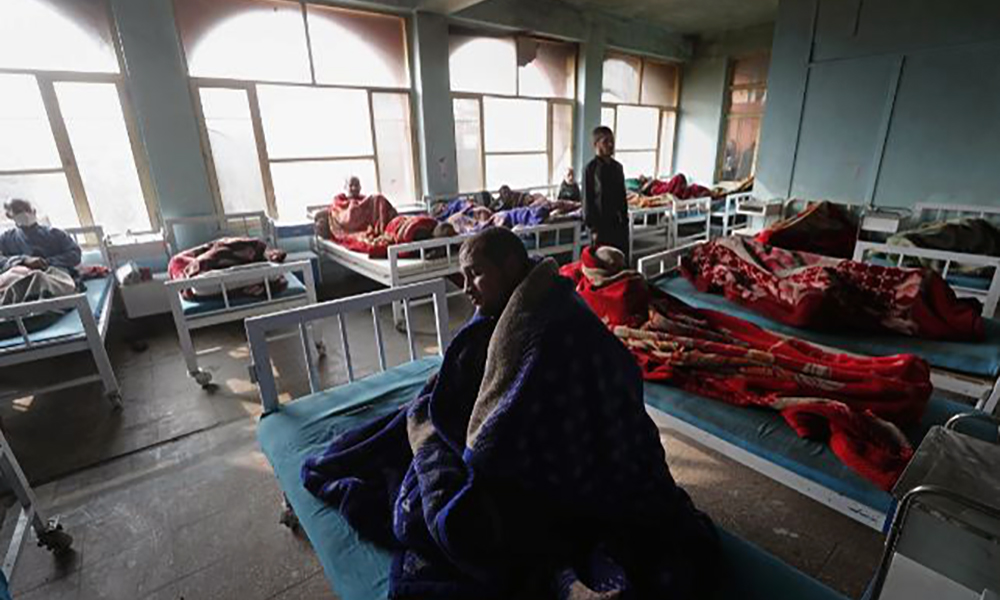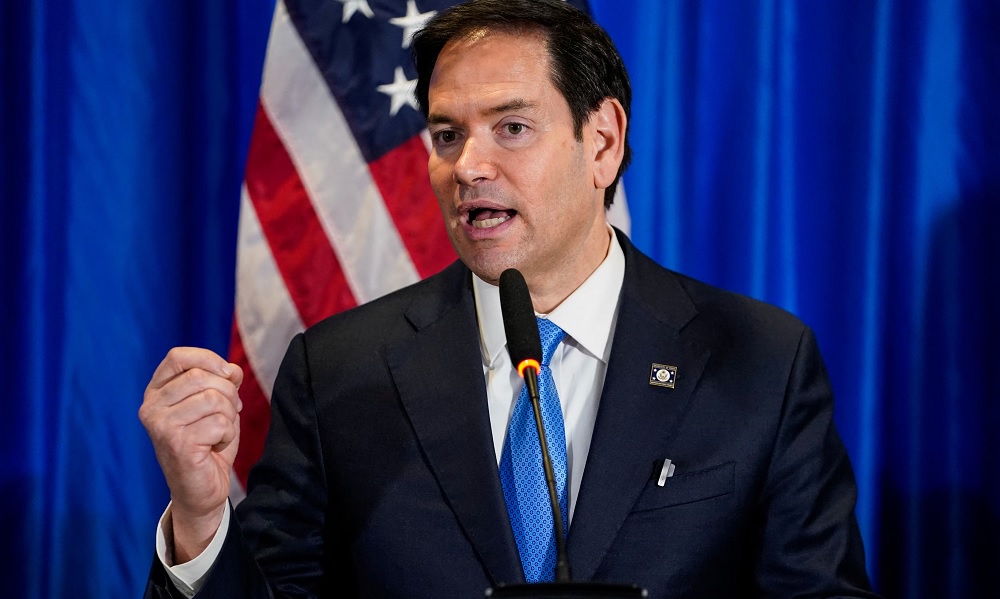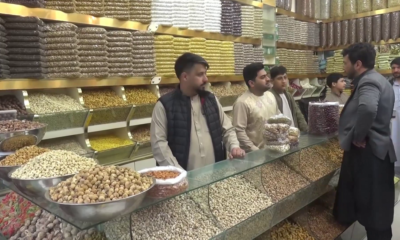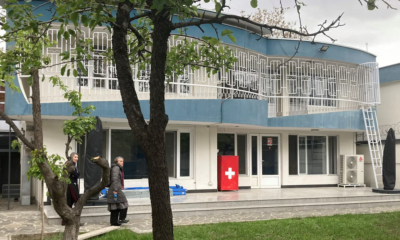Latest News
UNDP Afghanistan agrees to support 17 drug treatment centers

The United Nations Development Programme (UNDP) in Afghanistan signed an agreement to provide essential medicines and medical supplies for drug treatment with the United Nations Office on Drugs and Crime (UNODC).
The United Nations Development Programme (UNDP) in Afghanistan signed an agreement to provide essential medicines and medical supplies for drug treatment with the United Nations Office on Drugs and Crime (UNODC).
Through the 2 M USD partnership, UNDP and UNODC will jointly support the provision of essential medicine, equipment, and hygiene kits to 17 drug treatment centers across the country with a 930-bed capacity across the north, west, east, and central highland regions.
“Afghanistan is the world’s largest producer and cultivator of opium, which erodes families and societies from its core. UNDP Afghanistan is committed to safeguarding the Afghans’ health security and treatment when it is most urgent.” said Abdallah Aldardari, Resident Representative of UNDP Afghanistan.
“This is an important milestone for UNODC and UNDP’s strategic collaboration in Afghanistan and beyond,” said Anubha Sood, Representative of UNODC Afghanistan. “After August 2021, most drug treatment and rehabilitation centers in the country are struggling to remain operational. This agreement will rekindle joint UN efforts to tackle one of the most deep-seated issues affecting the men, women, and youth of Afghanistan.”
Since August 2021, UNDP Afghanistan has supported 6 M people with improved access to primary care through anti-malarial, HIV, and TB treatment and care under its flagship programme ABADEI. ABADEI is a UNDP-led socio-economic initiative to combat poverty and create sustainable, dignified livelihoods in Afghanistan, with women enterprises at one of its forefronts. It complements the Humanitarian Response Plan (HRP) in Afghanistan.
UNODC is operating to identify and address aspects of the drug and crime situation in Afghanistan, through advocacy in the policy arena; providing reliable information on opium poppy cultivation, production and prices; and through implementation in the field, delivery of effective alternative livelihoods, drug demand, and harm reduction support to people affected by drug dependence.
Latest News
Bulgaria brings five people to trial over deaths of 18 Afghan migrants

The Sofia City Prosecution Office brought five people to trial for participation in an organized criminal group, smuggling and the murder of 18 Afghan citizens, its press centre said on Tuesday.
On February 17, 2023, the bodies of 18 illegal migrants, who had apparently suffocated to death, were found on a truck near the village of Lokorsko (16 km north of Sofia).
The indictment states that 52 Afghans were loaded into a truck from the area of the village of Zidarovo, Burgas Region, Bulgarian News Agency reported.
According to the prosecution, two of the defendants saw that the Afghans could not breathe normally because they were pressed tightly together, but they closed the lids of the containers, fastened their seat belts and drove off.
Latest News
US won’t rest until all Americans detained in Afghanistan brought home: Rubio

US Secretary of State Marco Rubio said on Monday that the United States government will not rest until all Americans detained in Afghanistan are brought home.
“The United States is pleased to welcome home Faye Hall. President of the United States’ commitment to the American people is clear — we will not rest until all Americans detained in Afghanistan, and held hostage around the world, are brought home,” Rubio wrote on X.
The news of Fay Hall’s release was announced three days ago by former US special envoy for Afghanistan Zalmay Khalilzad.
She had been reportedly detained in February.
US State Department spokesperson Tammy Bruce told a news conference Monday that the US government’s “highest priority is the safety and security of the American people, wherever they may be.”
Latest News
Russian Supreme Court to consider suspending ban on IEA

Russia’s Prosecutor General’s Office has submitted a legal request to temporarily suspend the ban on the Islamic Emirate of Afghanistan (IEA), officially designated as a terrorist organization in Russia, state news agency TASS reported Monday.
According to the Supreme Court’s press service, the court has accepted the administrative claim concerning the suspension of the IEA’s status on Russia’s federal list of banned terrorist groups. A closed-door hearing is scheduled for April 17.
The move follows a law signed by President Vladimir Putin in December 2024 that permits the temporary suspension of such bans under specific conditions.
Leonid Slutsky, chair of the State Duma’s foreign affairs committee and leader of the Liberal Democratic Party of Russia (LDPR), has said the legislative change paves the way for Russia to officially engage with the IEA, which currently governs Afghanistan.
Under the revised legal framework, Russian courts may approve suspension of a ban if the prosecutor general or a deputy presents evidence that an organization has ceased terrorist activities and propaganda. Once a ruling is issued, it must be forwarded to the Federal Security Service (FSB) within five days to update the national terrorist registry.
The IEA has been listed as a banned terrorist organization in Russia since 2003. However, Moscow has recently sought to expand diplomatic and economic ties with it, despite the legal restrictions on formal engagement.
-

 Business5 days ago
Business5 days agoAfghanistan ships first consignment to Europe via Khaf-Herat railway
-

 Business4 days ago
Business4 days ago36 mining contracts inked over the past year: Mines ministry
-

 Latest News4 days ago
Latest News4 days agoDried fruit market in Herat booms ahead of Eid-al-Fitr
-

 Regional4 days ago
Regional4 days agoPowerful quake in Southeast Asia kills several, Myanmar declares state of emergency
-

 Latest News4 days ago
Latest News4 days agoUS may ask for military equipment left behind in Afghanistan: Trump
-

 International Sports4 days ago
International Sports4 days agoLucknow’s six-hitting machine Pooran justifies top order slot
-

 Latest News3 days ago
Latest News3 days agoMore than 70,000 Afghans returned home in third week of March: IOM
-

 Latest News4 days ago
Latest News4 days agoNegotiations with Afghanistan are the only way forward: Pakistan’s ex-PM Khan
























